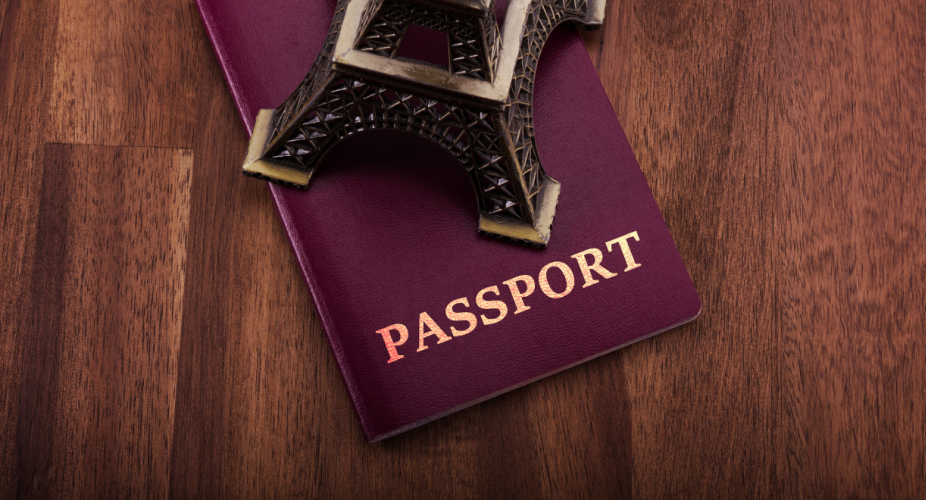- April 16, 2024
If you’re a non – EU citizen and entertaining the idea of living, working, or studying in France, you’ll need to apply for a long – stay visa. France has many options for long – stay visa seekers (check our list below) and you are likely already eligible for one of them!
It’s important to note that the road to permanent French residency is long, and can take a minimum of three years and a lot of paperwork but with a little patience and planning, you can achieve your dream of living in France!
At Earthrelo, we recommend working with a skilled immigration and visa attorney who can assist you with your family’s unique needs and requirements. We know that understanding the process is important.
There are 4 main steps to achieving permanent residency in France.
Step One: Long – Stay Visa Equivalent to a Residence Permit (Visa de Long Séjour Valant Titre de Séjour VLS-TS)
Valid for one year
Step Two: Temporary Residence Card (Carte de Séjour Temporaire)
Valid for one year
Step Three: Multi – year Residence Card (Carte de Séjour Pluriannuelle)
Valid (typically) for four years
Step Four: Permanent Residence Card (Carte de Resident Permanent)
Valid for ten years
Which Long – Stay Visa Do You Need?
There are many different types of long – stay visa (VLS-TS) available in France, and which one you choose depends on your individual and family situation. Eligibility criteria vary depending on the visa and your desired work status in France.
Temporary or Residence Long – Stay Visas
There are two principal types of long – stay visas: temporary or resident visas. If you are looking to travel to France for a period of up to six months, without becoming resident in France, you can apply for a Temporary Long-Stay Visa (visa de long séjour temporaire visiteur or VLS-T Visiteur).
These visas cannot be renewed and cannot be exchanged for a residency card or carte de séjour. You must leave the country when the visa expires; however, you may apply again for a temporary long – stay visa the following year making this a possible option for second – home owners.
For all other purposes, you will need to apply for a Long – Stay Visa Equivalent to a Residence Permit (visa de long séjour valant titre de séjour or VLS-TS). These visas are valid for 12 months and can be renewed by applying for a residency card or carte de séjour within two months of your expiration date.
Long – Stay Work Visas in France
There are various different long – stay visas available for those looking to work in France, the most common of which are listed below. The application process and functionality of these visas are all the same, and the only difference will be the kind of job your visa permits you to do, and the supporting documentation required.
Note that in addition to your work visa, a work permit is required in order to legally work in France.
‘Employee’ Long – Stay Visa (VLS – TS salarié)
This visa is intended for foreign workers being hired by a French company or by a foreign company to work in France. This position must be secured before coming to France, and a work contract and work permit will be required.
French long – stay work visas are issued for specialized or high skilled roles, for job fields with known labor shortages, or positions that could not be filled by French national candidates. For this reason, your employer will be responsible for your work permit and will be asked to prove that your job position meets the requirements for international recruitment.
Note: This visa is dependent on your job contract and work permit – it does not give you the right to move to France and seek employment on arrival. Depending on your personal and employment circumstances, this visa may allow your spouse and family to accompany you, although they will need to apply for the relevant visas in order to do so.
‘Seasonal Worker’ Long – Stay Visa (VLS – TS travailleur saisonnier) or ‘Temporary Worker’ Long-Stay Visa (VLS – TS travailleur temporaire)
A seasonal worker visa is conditional upon having a job contract and work permit in place. This visa does not allow your spouse or family to accompany you but is for those undertaking seasonal work for less than 6 months each year.
‘Business / Skilled Profession Long-Stay Visa (VLS – TS entrepreneur/profession libérale)
If you’re a self – employed worker, freelancer or business owner looking to set up your own business, this option might be suitable for you.
For this visa, you will need to apply for a work permit based on your self – employed status or business proposal (you can do that here). Expect to be asked to prove the viability of your professional activity, which might mean proving that you have skills or qualifications in your desired field. Proving that you have sufficient financial resources or income, or demonstrating the ‘economic viability’ of your project will be required.
‘Talent Passport’ Long-Stay Visa (VLS – TS Passport Talent)
This unique long – stay visa grants recipients an immediate four – year visa or carte de séjour, and means you are free to live in France, seek employment, or open a business in France. This visa also allows your spouse and family to accompany you, providing they apply for the relevant visas in order to do so.
There are various different situations that may qualify for a Talent Passport, but some include:
- Investors
- Start-ups and innovative businesses
- Graduates of masters degree programs
- Freelancers and self-employed people working in liberal professions (see the full list here)
‘Working Holiday’ Long-Stay Visa (VLS – TS Vacances-Travail)
If you are between 18 and 30, and are looking to travel or take a gap year in France, this visa will allow you to work during your visit.
France’s working holiday visa scheme is open for citizens of 15 countries, including Australia, New Zealand, and Canada (see the full list here). The US is not on the list.
**Note, however, that these visas are valid for up to one year and are not renewable.
Moving or Retiring to France Without Working
If you want to spend more than six months in France, or are hoping to move to France without working, you will need to apply for a ‘Visitor’ Long – Stay Visa (visa de long séjour visiteur or VLS-TS Visiteur). If you are a retired person hoping to move to France, this is the visa you will need.
Visitor visas have strict requirements over sufficient income and healthcare – you must be able to prove that you can support yourself without any help from the French state.
Expect to provide details of your accommodation sufficient funds (more than €1,300 monthly net), and private health insurance for your first year in France.
How to Apply for Your Long – Stay Visa
Once you have found which type of visa is right for you (see our list of visa types below), you can begin the application process for your French long-stay visa. Typically, you can apply for your visa up to three months before your planned arrival date in France.
Step One: Find out what kind of long – stay visa you need. Start your application process by using the visa wizard on the France Visas website here.
Step Two: The visa wizard will give you a list of documents that you will need to start your application process. These may vary depending on your nationality, country of application, marital status, and type of visa, so be sure to check the list carefully. However, some of the documents you should be prepared to present include:
- Your passport (this must be less than ten years old, with a validity of at least three months longer than the visa expiry date you are applying for). You will need to scan all relevant pages (including stamped pages and previous visas).
- Proof of residence in the country you are applying from if you are not a citizen
- 2 x ID photographs (following passport – style regulations)
- Proof of your socio – economic situation (retired, employed, self-employed, etc.)
- An attestation stating the purpose for your stay (for example, that you are a second – home owner wishing to visit or carry out maintenance on your holiday home)
- Proof of your private health insurance to cover your first year in France.
- Proof of your French residence, rental agreement, or intended place of residence. This can be a hotel, proof of home ownership, or an attestation from your host.
- Proof of sufficient funds (for example, three months of US bank statements showing your salary with your full name and address, those of your spouse/partner along with your marriage certificate, or a savings account with the full amount).
Step Three: File your Visa Application online.
Once you have filled in the online visa application form and attached all the relevant documents (typically in a pdf or jpg form, but always follow the specific instructions given), you can submit your visa application.
The visa application fee will be payable at the time of submitting your application. This is a processing fee paid to the visa center handling your application and is non – refundable, even in the case that your application is refused. Fees vary depending on the country of application. Additional credit card transaction fees may also apply.
Step Four: Book your appointment at the nearest French embassy or visa center.
This in – person appointment is essential to securing your visa and should be organized as soon as possible – or a minimum of two weeks before your departure date.
*IMPORTANT* You must print out your receipt and CERFA application form (and it must NOT have the word DRAFT on it) and bring it to your appointment with you.
Step Five: Gather Your Documents
Along with your printed receipt and CERFA form, be sure to bring all the required documents on the list provided – make sure you bring both the originals and copies. It’s a good idea to bring any supporting documentation, too, just in case.
Step Six: Attend The Visa Appointment
Attend the appointment at your nearest French embassy or visa center, where you will be asked to present all the required documents. The meeting takes around 20 minutes, and they will review your application and documents, capture your biometric data (photo and fingerprints) for your visa, and collect your visa application fee. Your passport will be kept to apply the visa page.
Step Seven: Track Your Application
Track your application status online and wait for notification that your visa is ready to collect from the embassy. You can also ask that your visa be sent to you by courier (for an extra cost).
Step Eight: Arrival In France
On arrival in France, don’t forget to get your passport stamped – if you arrive in France via another country, you must present yourself at your local préfecture to get your passport stamped with your date of arrival. If flying to France, be prepared to present your supporting documents at the border, including proof of your accommodation, sufficient funds, and health insurance certificate.
Step Nine: Validate Your Visa
You must validate your VLS – TS visa within three months of arriving in France – failure to do so will not only mean that you are unlawfully residing in France, but it also means you won’t be able to leave and return to France for the duration of your visa. The validation process can be done online here – you will need to enter the information on your visa and additional personal information, give your date of arrival in France and your French address, and pay the state tax.




